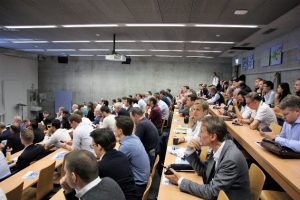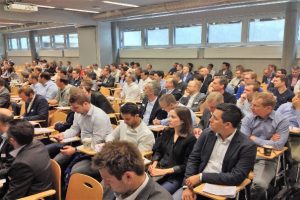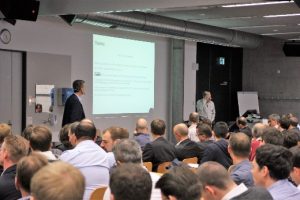2nd European COST Conference on Mathematics for Industry in Switzerland
September 7, 2017
Zurich University of Applied Sciences,
Technikumstr. 71, 8400 Winterthur
By Jörg Osterrieder (ZHAW)
Below please find a short recap and an outlook for our next conference on September 6, 2018.
Aim of the conference
The aim of this conference was to bring together European academics, young researchers, students and industrial practitioners to discuss the application of Artificial Intelligence to various practical fields. In a broader context, we wanted to promote «Mathematics for Industry» in Switzerland, as part of the European COST (Cooperation in Science and Technology) Action “Mathematics for Industry”, where members of ZHAW are in the management committee for Switzerland.
COST is the longest-running European framework supporting transnational cooperation among researchers, engineers and scholars across Europe. The 1st European COST Conference in Switzerland on this topic was held on September 15, 2016. A third installment is planned for Thursday, September 6, 2018.
Speakers
The conference began with the key-note speech on “Machine Learning in Trading” by Prof. Brian Peterson, from the University of Washington and DV Trading, giving insight in the impact and extent of this emerging technology within its applicational frame in trading.

Following this, we had two parallel thematic sessions. One leg focused on Financial Mathematics application of machine learning, whereas the other one dealt with the implications for Industrial Mathematics.
Please find a short list of the speakers below, with an excerpt attached as a summary of their presentation.
Finance
Saeed Amen, Cuemacro: Using Big Data to trade Macro Assets
“We discuss the types of unusual datasets which are available for trading purposes. We define the difference between unstructured and structured datasets. We also give a case study of using Big Data, creating macro-economic sentiment indices from RavenPack news data, showing how they can be used to trade bonds and FX.”
Dr. Pascal Böhi, Fintegral AG: Credit Risk Evaluation with Machine Learning Techniques
“This talk will cover different data analysis and machine learning techniques, and analyze the automation of the variable/feature selection process for the generation of robust credit scoring models. Furthermore, benchmarking of the aforementioned techniques to well-established, industry standards will be demonstrated.”

Dr. Christopher Bruaffaerts, InCube Group: Recommender System for Personalized Investment
“In this talk, we will see how Case-based recommender systems can take into account the specificities and constraints of the financial domain to appropriately recommend investment proposals”
Prof. Dr. Matthias Fengler, Universität St. Gallen: Does Sentiment drive the Market?
“We find that options variables indeed predict stock returns, yet sentiment variables, in particular, our index sentiment remains a highly relevant factor for individual stock returns”
Dr. Julian Lorenz, Bantleon Bank: Forecasting financial Markets using boosted Decision Trees
“We present decision trees (CART) and boosted decision trees (using AdaBoost) in the context of forecasting financial markets, formulating the forecast problem as binary classification in a supervised learning setup.”
Prof. Dr. Natalie Packham, Berlin School of Economics and Law: Tail Risk Protection Trading Strategies
“Finally, by empirically testing for second-order stochastic dominance, we find that risk averse investors would be willing to pay a positive premium to move from a static buy-and-hold investment in the DAX future to the tail-risk protection strategy.”
Dr. Jochen Papenbrock, Firamis AG: Financial Networks and related AI in Financial Services
“In this talk we will give an overview of the methods and present some use cases in asset management and banking. The related software platform architectures will also be discussed.”
Henrik Stutz: Predicting Tail Events for Equity Indices using Machine Learning Algorithms
“In this talk, results for the tail prediction of events during the closing hours of various stock markets were analyzed. Namely the methods in question were CART, Random Forests, Bagging and Boosting.”
Prof. Dr. Mario Wüthrich, ETH Zürich: Machine Learning applied to Non-Life Insurance Problems
“The aim of this presentation is to bridge the gap between the actuarial community and the machine learning community. We present actuarial problems and discuss machine learning methods.”
Industry
Dr. Juan Pablo Carbajal, EAWAG: Speeding up numerical Simulators with Emulators
“In this talk I will introduce the latter (fast surrogate model) approach, describe its relation to model order reduction, comment on the general-purpose vs. specific trade off in terms of efficiency of computation, and present some recent advances in emulation methodologies.”

Dr. Martin Fengler, Meteomatics: Solar and Wind Power Forecasting
“This talk is about introducing the different modeling approaches which involve machine learning methods.”
Prof. Dr. Joachim Giesen, Universität Jena: Matrixcalculus.org
“In this talk I will demonstrate the tool using the classroom example of logistic regression from the domain of machine learning.”
Dr. Christian Jäger, ZHAW: Energy Management in HVAC, from classical optimization to artificial Intelligence
“This talk presents results and insights from the development of a control system based on classical optimization algorithms focusing on resource-efficiency as well as the outline of a planned follow-up project, aimed at using machine learning methods to adapt to inhabitants needs and preferences.”
Dr. David Mordaunt, Precision Light: 4D Imagining and Modelling for plastic Surgery
This talk shed light on the application of spatial and temporal body modelling for the prediction of the results of surgical procedures.
Dr. Hans Rudolf Moser, UZH: Generalized Entropies in empirical Time Series: Inherent Properties and forecasting Intervals
“A theoretically as well as practically powerful outcome of dynamical systems theory is the possibility to determine dynamical invariants by virtue of a long-term integration.”
Dr. Roxana Istrate, IBM: Incremental Training of Deep Convolutional Neural Networks
“We propose an incremental training method that partitions the original network into sub-networks, which are then gradually incorporated in the running network during the training process.”
Dr. Christian Spindler, PWC: Automated Machine Learning in transactional Data
“The talk gives an introduction into PwC’s proprietary solution for automated machine learning. By means of our Data Science Machine, we are able to find and optimal set of algorithm, hyperparameter tuning and selected features to solve a given problem.”
Dr. Sebastiano Vascon, ECLT: Hume Nash Machines: Context-Aware Models of Learning and Recognition
“In this talk I’ll describe a framework for pattern recognition problems which is grounded in the primacy of relational and contextual information at both the object and the category levels.”
Participants

The number of participants exceeded our initial estimates. Overall, we had more than 190 registrations. Regionally, we covered all of Switzerland, with the focus on the larger Zurich area.
This iteration of the COST conference saw a large number of international guests and speakers, travelling to Switzerland from destinations such as the UK, Germany, the United States and Bulgaria.
We have had a large proportion of representatives from the industry complemented by a smaller number of academic researchers.
Organizing Committee
The organizing committee consisted of members of ZHAW, both the School of Engineering and the School of Management and Law:
Dr. Jörg Osterrieder
Prof. Dr. Dirk Wilhelm
Prof. Dr. Rudolf Füchslin
Dr. Andreas Henrici
Prof. Dr. Peter Schwendner
